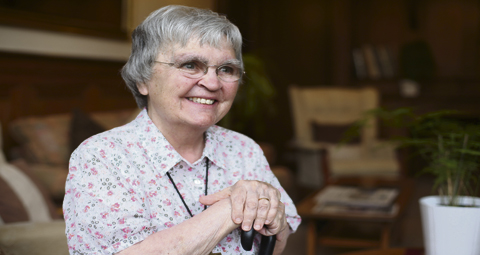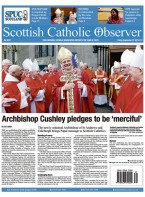August 23 | ![]() 0 COMMENTS
0 COMMENTS ![]() print
print

Honouring the gentle art of ‘being done good to’
Notre Dame Sister Marie Tighe, formerly based in Barra, explains why carers and the health service deserve praise and support
Many years ago at a Nursing conference I heard about ‘the gentle art of being done good to.’ The speaker said that nurses are so busy trying to help others that they forget that they too have needs, and that other people might want to be good to them. In the intervening years I did not practice the GABDGT very much myself.
On Grand National Day this year as I waited for the Liverpool train on Piccadilly Station, Manchester, the platform was crowded with gorgeously dressed race goers. I felt like a sparrow that had accidently landed in a cage full of tropical birds. Then one of the birds said to me: “Don’t worry about your case Luv, I’ll put it on the train for you.” The he commanded the exotic birds to stand back and let this lady on first. There was a lot of banter and good humour as my case was handed over heads and they tried to find me a seat—especially when I told them my Aintree hat was in that heavy case! In their company I know I was ‘being done good to!’
I was on my way to our Province Gathering at Notre Dame Convent, Childwall and the feeling of BDGT continued as I was welcomed and hugged by so many sisters. Perhaps a hug is one of the loveliest ways of BDGT!
At the meeting, we sisters looked together at the way some of our diminishments are becoming more apparent as we age. One of the sisters said that we should look on our diminishments as challenges to new growth in our lives. I resolved there and then that in the future I would try to do this. Little did I know then that less than two weeks later I would be challenged by the diminishment caused by a heart attack.
At that time I was the parish sister on the Isle of Barra in the Outer Hebrides and had to be helicoptered out to the Golden Jubilee Hospital in Glasgow for immediate treatment after which I was transferred to the Coronary Care Unit at the Southern General in Glasgow. As I was wheeled into the ward I was greeted by a cheery nurse who said: “Welcome, this is your lucky day. Today is our ‘be good to patients’ day. Let’s get you into bed and I’ll make you a cuppa. Make the most of it —it might not last!” But it did last all the time I was in that ward, and I was only too glad to let them be good to me.
This began my learning curve in the GABDGT and by the time I left that ward I think I must have gained at least an ‘ology’ in the GABDGT.
I returned home to Barra determined to meet the challenge of a recovery from the heart attack. There is a great community of people on Barra, and I was very aware of how good they were to me.
Meals and home baking were supplied in abundance—without the asking. So much so, I was able to donate packages of scones and pancakes to people who came to visit!
The freezer was packed with cartons of homemade soup. I really was being done good to by the kindness and love of these wonderful people.
Then the God of surprises pulled another trick out of His hat. Perhaps I needed even more practice in the GABDGT. The anticoagulants given for the heart attack caused a tumour on the pituitary gland to haemorrhage and for the second time in four weeks I had to be helicoptered out to the Southern General Hospital in Glasgow. Within a few hours the tumour put such pressure on the optic nerves that I became totally blind. I cannot describe the incredible total care I was given in the neurosurgical unit. I was treated with such dignity, compassion and love. In the book The Little Prince, I think it is the Fox who says to the Little Prince: “Only with the heart can one see rightly. What is essential is invisible to the eye.” In the weeks that followed the surgery on the pituitary tumour I could not see with my eyes, but I could sense the beauty of each person who touched me. My ‘ology’ in GABDGT was upgraded to at least an honour’s degree!
During my last week in the NSU I recovered a little sight, enough to walk around with the help of a nurse. I could also distinguish between black and white and I discovered that I had a little tunnel of vision that enables me to read large black print on white paper. Because I am registered as a blind person (even though I can see a little) I am able to access all the helps that are available to blind people. My favourite aid is a talking clock!
After four weeks in hospital I wanted everyone to know how much I appreciated the wonderful care I had benefitted from the National Health Service. Sadly there is a great deal of negative press about the NHS and I would like to redress the balance. I was interviewed by the Glasgow Evening Times and an article was printed to try to make people aware that the NHS is in danger of being dismantled as politicians in their ‘wisdom’ sell off sections to private enterprise. My fear is that Privatisation will move the focus of caring for each individual patient to the need to make financial gain for the companies providing the care.
May I issue a challenge to readers of this article? I ask that you remember the times you were ‘done good to’ by someone in the NHS. It could be a nurse, a cleaner, a doctor or even another patient who helped to make a difference to your life. For myself I nominate Miss Littlechild, the Consultant Surgeon in the NSU, and I thank her and all her team who were so good to me. Perhaps you might be inspired to share your stories in this paper—and that will do us all good!
Because of my limited vision and the need for ongoing post operative care after the surgery on the tumour I am no longer able to return to Barra. Instead I have now joined our Community for Sisters who need to be cared for (to be ‘done good to’!) at Parbold. The care here is wonderful and I think that I will soon be putting in for a Doctorate in BDGT!
As a Sister of Notre Dame my thoughts are drawn to our foundress, St Julie (left). For 23 years Julie was an invalid and totally dependent on the goodness of others. She certainly had to practise the GABDGT. There must have been many times when people thought that they were being good to Julie, and maybe it was not at all what she wanted or needed. All her life Julie’s constant and oft repeated words were Ah qu’il est bon, le bon Dieu—Isn’t God Good. We have those words on the back of the crosses that we wear to identify ourselves as SNDs.
In our Constitutions we read: “Our aim is to express in our time as Julie did in hers, that God is Good.” Surely this means that as well as actively trying to be good to others, we must, like Julie, allow others to be good to us!
In our Gospel we see how Jesus shared His love and goodness with the people of His time. In Luke’s Gospel Chapter 5 we hear one Leper say to Jesus: “Lord, if you want to, you can cure me.” Jesus’ answer is an emphatic ‘of course I want to!’ When dealing with blind Bartimeous, Jesus asks him, ‘What do you want me to do for you?’ Jesus Himself needed to be done good to. We see him in Simon the Leper’s house graciously accepting being done good to by the woman who washed His feet with her tears and dried them with her hair.
Perhaps we see His need for others to be good to Him most in the Garden of Gethsemanae. He needed the love and support of His friends most of all then.
We, each one of us need love and support from others—but most of all we need God’s loving kindness. St John in his first letter says: “This is the love I mean, not our love for God, but God’s love for us.”
Maybe we need to just sit still and let God be good to us and—let God love us into life!
—This story ran in full in the August 23 edition print of the SCO, available in parishes











